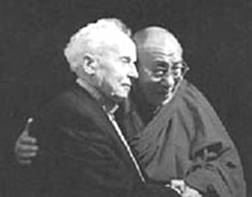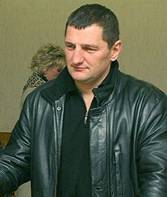
THE VOICE OF INTERNATIONAL LITHUANIA
|
VilNews has its own Google archive! Type a word in the above search box to find any article.
You can also follow us on Facebook. We have two different pages. Click to open and join.
|
Lithuania’s Good/Evil

The deepest foundation on which morality is built is the phenomenon of empathy,
the understanding that what hurts me would feel the same way to you.
Time Magazine, March 2007
Lithuanians are probably among the world’s most contrast-embossed peoples.
On the one hand, this nation brought forth very prominent humanists, thinkers and skilled professionals in many fields; scientists, politicians, businessmen, church leaders and leaders within culture, science and many other areas.
On the other hand, Lithuania is overrepresented among Europe's criminal gangs, and also internally in this country there are many individuals and groups that have given Lithuania an international disgrace spot that will be difficult to wash away, at least in the short term.
I spoke a few days ago with a friend from my home county far up in northern Norway. He told me that five years ago he had become aware of a Lithuanian who had moved to the town where my friend lives. This Lithuanian, my friend told, got a job in a carpentry workshop which had never distinguished themselves with particularly high quality of the products they delivered. But in less than a year all became very different, when the Lithuanian proved to be a very capable carpenter. Not only were the products now supplied of much higher quality and all delivered according to agreed time and price, but also the company itself seemed to undergo a change for the better, all because of a skilled Lithuania that so clearly showed what real quality and work ethics mean for a company.
In the same area in Northern Norway a leading police chief in an interview with a local newspaper asked people to report to the police if they saw cars with Lithuanian number plates, and in another Norwegian district, people have already through several years made it a rule that they alert the police as soon as they see a car with Lithuanian registration plates.
Norwegian and other European prisons are packed full of Lithuanian criminals, and many have asked themselves whether the price of the Schengen Agreement for open borders in Europe is already becoming too high. It is also constantly asked why Lithuania itself does not do much more to crack down on criminal bands in the towns and districts where they originate.
Increased punishment and restriction of freedom does of course not solve a serious problem like this, and I am of the opinion that the authorities, communities and neighbourhoods must be far more actively working in teaching and integrating children and youth from families with potential problems. The many fine people who value honesty and justice high should no longer sit still, but take immediate action to help Lithuania's future generations follow in the footsteps of the good.
My guide was Monsignor Kazimieras
One of the first things I experienced when I came to Lithuania 21 years ago, was a private tour of the cellars under the Vilnius Cathedral. My guide was Monsignor Kazimieras Vasiliauskas, who in a truly remarkable manner managed to make alive Lithuania’s proud history while we walked among the graves of the country’s former dukes and others who so greatly helped to make Lithuania a world leading country for hundreds of years. The Monsignor told me about his years in, respectively, German and Russian captivity, and I left the Cathedral with a deep sense of respect and admiration for this great country and a cleric who had been forced to so much suffering because he always kept his faith and humanity high. I felt I had been very close to this nation's historical and contemporary pride and goodness for a few minutes, represented by the graves of the country's prominent leaders through the centuries and a man who so clearly had preserved his faith in good, even throughout many years of imposed suffering.
I have never personally met Henrikas Daktaras, the man often referred to as Lithuania’s leading criminal authority, but I have through many years seen the results of his and his like-minders’ destructive activities both here in Lithuania and also far beyond Lithuania’s borders. The admiration and respect I got for Lithuania after the tour with Monsignor Vasiliauskas felt almost like a distant dream as I in the early 1990s started discovering what was going on in this country; with regards to corruption in the corridors of power, of public 'theft' from its own people, as well as acts committed by criminals and half criminals with greed and lack of respect for their fellow man as their leading motives.
Wikipedia states that evil are the acts that are regarded as morally bad, intrinsically corrupt, wantonly destructive, inhumane, selfish, or wicked.
As per another definition, evil is that which is the reverse of good, whatever is censurable, mischievous, or undesirable, morally depraved, bad, wicked, vicious; doing or tending to do harm, hurtful, mischievous, prejudicial, depraved intention or purpose, desire for another's harm, causing discomfort, pain, or trouble, unpleasant, offensive, disagreeable, troublesome, painful.
Lithuania's good people should not let the destructive and selfish powers rule or continue to influence fine people’s lives here and abroad. Those who want the best for this nation should as soon as possible start discussing what could be done to take control over and neutralise the nation's destructive forces, no matter where and at what level these now reside.
Lithuania deserves to again be counted among the world's great nations, but it is up to the Lithuanians themselves to fight the evil and the negative forces that still have far too free scope to continue their misdeeds. As long as these forces find fertile ground in the Lithuanian society, this country will remain on a stage of development that should have been left behind long ago.
Aage Myhre,
Editor
| Monsignor Kazimieras Vasiliauskas (1922 – 2001)  Catholic priest, monsignor. Spent years as a prisoner in Germany and later in Stalin's concentration camps and at the coal mines of Komi, Siberia. The Soviet authorities only permitted him to return to Lithuania in 1969. |
Mafialord Henrikas Daktaras (1957 - )  Dr. Henry (alias – Henytė) – one of the most famous criminals of all times in this country. Local media often refer to him as Lithuania’s main criminal authority. |
- Bookmark :
- Digg
- del.icio.us
- Stumbleupon
- Redit it
VilNews e-magazine is published in Vilnius, Lithuania. Editor-in-Chief: Mr. Aage Myhre. Inquires to the editors: editor@VilNews.com.
Code of Ethics: See Section 2 – about VilNews. VilNews is not responsible for content on external links/web pages.
HOW TO ADVERTISE IN VILNEWS.
All content is copyrighted © 2011. UAB ‘VilNews’.

 Click on the buttons to open and read each of VilNews' 18 sub-sections
Click on the buttons to open and read each of VilNews' 18 sub-sections 



Doctor Henry – good one! :D His name is Henrikas Daktaras. He is not a Doctor ;P
[…] Lithuania’s Good/Evil […]